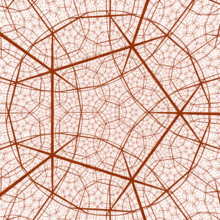Hyperbolic manifold
In mathematics, a hyperbolic manifold is a space where every point looks locally like hyperbolic space of some dimension. They are especially studied in dimensions 2 and 3, where they are called hyperbolic surfaces and hyperbolic 3-manifolds, respectively. In these dimensions, they are important because most manifolds can be made into a hyperbolic manifold by a homeomorphism. This is a consequence of the uniformization theorem for surfaces and the geometrization theorem for 3-manifolds proved by Perelman.


Rigorous Definition
A hyperbolic -manifold is a complete Riemannian n-manifold of constant sectional curvature -1.
Every complete, connected, simply-connected manifold of constant negative curvature −1 is isometric to the real hyperbolic space . As a result, the universal cover of any closed manifold M of constant negative curvature −1 is . Thus, every such M can be written as where Γ is a torsion-free discrete group of isometries on . That is, Γ is a discrete subgroup of . The manifold has finite volume if and only if Γ is a lattice.
Its thick-thin decomposition has a thin part consisting of tubular neighborhoods of closed geodesics and ends which are the product of a Euclidean n-1-manifold and the closed half-ray. The manifold is of finite volume if and only if its thick part is compact.
For n>2 the hyperbolic structure on a finite volume hyperbolic n-manifold is unique by Mostow rigidity and so geometric invariants are in fact topological invariants.
See also
- Hyperbolic 3-manifold
- Margulis lemma
- Hyperbolic space
- Hyperbolization theorem
- Normally hyperbolic invariant manifold
References
- Kapovich, Michael (2009) [2001], Hyperbolic manifolds and discrete groups, Modern Birkhäuser Classics, Boston, MA: Birkhäuser Boston, doi:10.1007/978-0-8176-4913-5, ISBN 978-0-8176-4912-8, MR 1792613
- Maclachlan, Colin; Reid, Alan W. (2003), The arithmetic of hyperbolic 3-manifolds, Graduate Texts in Mathematics, vol. 219, Berlin, New York: Springer-Verlag, ISBN 978-0-387-98386-8, MR 1937957
- Ratcliffe, John G. (2006) [1994], Foundations of hyperbolic manifolds, Graduate Texts in Mathematics, vol. 149 (2nd ed.), Berlin, New York: Springer-Verlag, doi:10.1007/978-0-387-47322-2, ISBN 978-0-387-33197-3, MR 2249478
- Hyperbolic Voronoi diagrams made easy, Frank Nielsen




